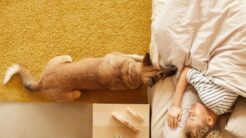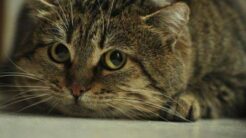Bearded dragons are known for their relatively lazy nature compared to other reptiles. As an experienced lizard owner, I’ve noticed that some bearded dragons have more energetic personalities, while others prefer to rest more. However, excessive sleep can sometimes be a sign of an underlying issue with their habitat or health. In this article, I will outline some potential reasons why your dragon may be sleeping more than usual.
Table of Contents
Possible Causes of Excessive Sleep
-
Improper heating/lighting
Bearded dragons are cold-blooded creatures that rely on external heat sources to regulate their body temperature. If the heating or lighting in their habitat is inadequate, they may become lethargic and sleep more. It’s essential to ensure that the basking area is warm enough, and they have access to UVB light, which helps them metabolize vitamin D3 and absorb calcium properly.

-
Boredom
Just like any living being, bearded dragons can get bored. If they spend their days in the same environment without any stimulation, they may become lethargic. To combat this, provide enrichment activities such as different hiding spots, rocks, or decorations for them to explore. You can also offer their food in various ways or take them on supervised adventures outside their enclosure.
-
Brumation
During the winter months, bearded dragons may enter a state of brumation, which is similar to hibernation for reptiles. This natural process slows down their metabolism and causes them to sleep for extended periods. It’s essential to provide them with fresh water and maintain a clean enclosure during this time. They will naturally return to their usual activity levels when the season changes.
-
Shedding
When bearded dragons shed their skin, they may exhibit changes in behavior and become more lethargic. The shedding process can be uncomfortable and stressful for them, making them more vulnerable to predators. Allow your dragon to complete the shedding process independently, but you can assist by providing regular warm water soaks to help soften the skin.

-
Age
Young bearded dragons, like human babies, require more sleep as they are in the developmental stages of their lives. Their bodies are growing and building bones, so additional sleep is necessary for optimal growth. However, excessive sleep can also be a sign of stress. If you feel your baby dragon is stressed, provide them with privacy by covering their tank or consider moving them to a quieter area of your home.
-
Dietary problems
A balanced diet is crucial for the overall health and energy levels of bearded dragons. If they are not receiving a varied diet with a wide range of nutrients, they may become lethargic. Ensure that they have access to different insects, fruits, vegetables, and appropriate supplements such as multivitamins and calcium powder. Dehydration can also contribute to lethargy, so monitor their water intake and provide hydrating foods like watermelon.
-
Illness and disease
Lethargy can be a common symptom of various illnesses and diseases in bearded dragons. Common ailments include parasitic infections, impaction (blockage of the digestive tract), and Metabolic Bone Disease (MBD). If you notice any other symptoms like vomiting, abnormal defecation, weight loss, or mobility issues, it’s crucial to seek veterinary care to properly diagnose and treat your dragon.
When To Seek Veterinary Care
If your bearded dragon’s excessive sleep is accompanied by abnormal behavior or visible symptoms, it’s important to consult a veterinarian. Monitor their bathroom habits and inspect their fecal matter regularly to get a better understanding of their overall health. Visit a vet if your dragon experiences vomiting, weight loss, constipation, walking difficulties, diarrhea, sunken eyes, twitching limbs, swollen mouth or limbs, or if you notice any unusual lumps on their body.
Remember, bearded dragons’ health and well-being should always be a top priority. Proper husbandry, a balanced diet, and regular veterinary check-ups are essential for keeping your dragon happy and active.
For more detailed information on bearded dragon care and other topics, visit 5 WS – your go-to source for comprehensive, reliable information.
Frequently Asked Questions
-
Why is my bearded dragon sleeping so much?
Bearded dragons have different sleep patterns, and excessive sleep can be due to various reasons such as improper heating/lighting, boredom, brumation, shedding, age, dietary problems, or illness.
-
How can I ensure proper heating and lighting for my bearded dragon?
Use a temperature gun to check the basking spot’s temperature and adjust it accordingly. Make sure the enclosure is warm enough and provide a UVB light source, replacing it every six months.
-
What can I do to prevent boredom in my bearded dragon?
Provide enrichment activities like different hiding spots, rocks, or decorations. Vary their diet and offer food in different ways. Supervised adventures outside their enclosure can also provide mental stimulation.
-
Should I be concerned if my bearded dragon is shedding?
Shedding is a natural process for bearded dragons. Allow them to complete the shedding process independently, but you can assist by providing regular warm water soaks to help soften the skin.
-
Why do baby bearded dragons sleep more than adults?
Baby bearded dragons require more sleep due to their developmental stages. However, excessive sleep can also be a sign of stress. Ensure they have a stress-free environment and appropriate hiding spots.
-
How can I prevent dietary problems in my bearded dragon?
Offer a varied diet with different insects, fruits, and vegetables. Use supplements like multivitamins and calcium powder. Monitor their water intake and provide hydrating foods if necessary.
-
When should I be concerned about my bearded dragon’s sleep patterns?
If your bearded dragon exhibits other symptoms like vomiting, abnormal defecation, weight loss, mobility issues, sunken eyes, twitching limbs, swollen mouth or limbs, or unusual lumps, it’s important to seek veterinary care.
Remember, observing your bearded dragon’s behavior and promptly addressing any concerns will contribute to their overall well-being and happiness.
Note: The images used in this article are for illustrative purposes only and may not depict the exact species or situation described.


